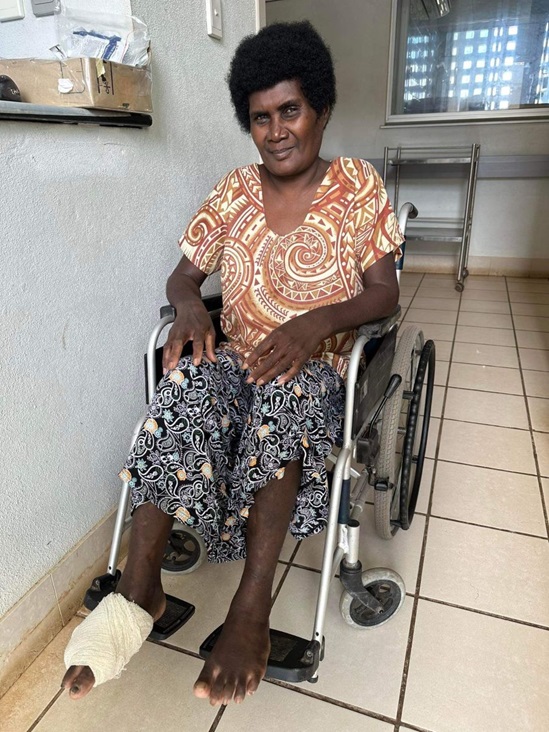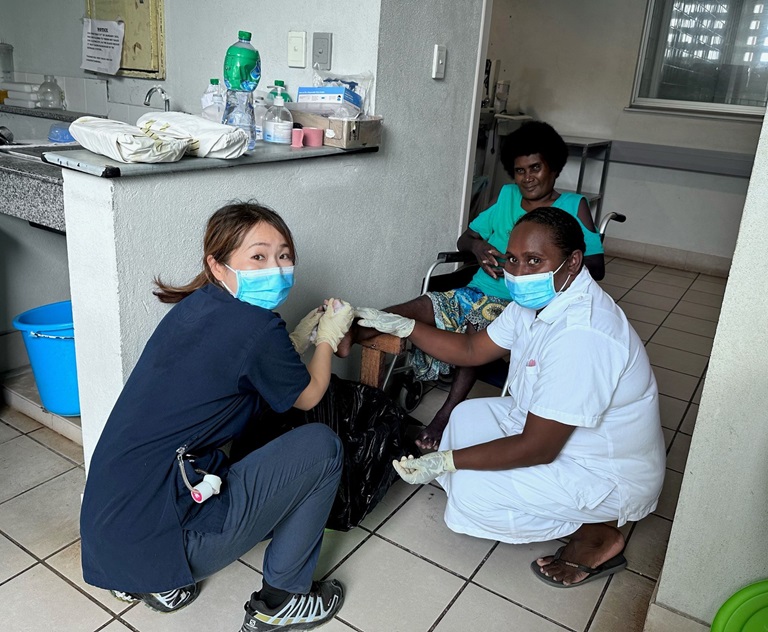WHO Global Coordination Mechanism on NCDs
The WHO GCM/NCD Year-in-Review 2025: Partnerships and Actions on NCDs
Meaningful Engagement of People with Lived Experiences
17 Dec 2025
WHO Regional Office for Western Pacific | 20 Dec 2023
In the Solomon Islands, diabetes affects 1 in 7 people. When Mrs Siloute, who lives in the country’s Western Province, was diagnosed with diabetes, she was afraid. “My life was forever changed,” she says. “I saw many diabetics have their feet cut off, and I was afraid I would have my foot cut off too. Her fears intensified when a sore grew to cover her whole foot.
The risk of amputation was real. Despite the prevalence of diabetes in Solomon Islands, most people do not know they have it until they begin experiencing complications. Ulcerations on the legs and feet are a common complication and without proper care, this can lead to amputation. This has become a significant issue in the Solomon Islands and foot amputation has become the most common surgery in major hospitals nationwide. Once an amputation occurs, the risk of death is very high. Unless patients are able to regulate their blood sugar, many progress to conditions such as kidney failure, blindness, stroke and heart attacks.

Until recently in the Solomon Islands, the only treatment available for Mrs Siloute’s ulcerated foot was amputation. But now, health workers are learning other methods. Tomoko Hamada, a nurse volunteer with the Japanese International Cooperation Agency, is teaching local nurses how to thoroughly wash ulcerated feet with soap and water, apply a medical ointment that softens unhealthy tissue and wrap the wound to keep it moist and heal.
Mrs Siloute is one patient who has benefited from this care. “I am amazed how my foot looks so much better,” she shares. “I hope one day I will be able to walk again.
Lovelyn Hicky, a nurse at Gizo Hospital, says that the new approach has improved her patients’ quality of life immeasurably. Before, she explains, patients who were given amputations faced significant challenges. With limited mobility, they found it difficult to provide for themselves and care for their families. Avoiding the need for amputation has changed this. “Now, my diabetic patients remain active, play with their kids and live relatively normal lives,” she says. “I feel great about my work in Gizo Hospital. Following these positive results at Gizo Hospital, the Solomon Islands Ministry of Health and Medical Services (MHMS), the National Referral Hospital (NRH) and the World Health Organization (WHO) working together to enable all health centres and outpatient departments around the country to better identify and manage diabetes and diabetic foot care.

Joining forces to address noncommunicable diseases
Diabetes has become a growing problem as Solomon Islanders move away from an active lifestyle with diets mostly consisting of food grown in their own gardens, like taro, cassava and cabbage. Now, rice, instant noodles, sugar-sweetened beverages and fast foods that are high in saturated or trans fats are widely eaten. Rates of smoking, alcohol consumption and inactivity have also grown dramatically, increasing the risk of all major noncommunicable diseases (NCDs), including diabetes.
Solomon Islands is not alone. Diabetes is one of the four major NCDs and its prevalence has been steadily increasing in recent years. It is estimated that over 260 000 people in the Western Pacific Region died due to diabetes in 2019.
WHO and Member States are taking strong action to address this significant health issue. Last year, the World Health Assembly endorsed five global diabetes coverage and treatment targets to be achieved by 2030, including the aim that 80% of people with diabetes are diagnosed and have good control of their glycaemia and blood pressure.
To work towards this goal, the MHMS marked World Diabetes Day by launching the Noncommunicable Disease Record Book. The Record Book, developed by MHMS alongside WHO with financial support from the Australian Department of Foreign Affairs and Trade, is a tool to empower all Solomon Islanders with the knowledge they need to prevent, detect, and manage all NCDs, including diabetes. It allows health workers to keep track of patients’ progress and care and advises patients about ways to reduce their risk of NCDs, such as exercise, healthy eating and avoiding tobacco.
The MHMS, NRH and WHO are also working together on an NCD Roadmap and other policies to accelerate actions on NCDs. Mr Ghemu, Director of Policy and Planning at MHMS said, “My appeal is that all of us join forces to ensure all Solomon Islanders have access to diabetes prevention and care. All sectors have key roles to play.